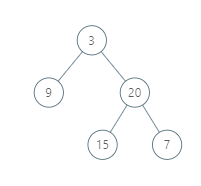Difficulty : Medium
Related Topics : Tree、HashTable
Given a binary tree, return the vertical order traversal of its nodes values.
For each node at position
(X, Y), its left and right children respectively will be at positions(X-1, Y-1)and(X+1, Y-1).Running a vertical line from
X = -infinitytoX = +infinity, whenever the vertical line touches some nodes, we report the values of the nodes in order from top to bottom (decreasingYcoordinates).If two nodes have the same position, then the value of the node that is reported first is the value that is smaller.
Return an list of non-empty reports in order of X coordinate. Every report will have a list of values of nodes.
Input: [3,9,20,null,null,15,7] Output: [[9],[3,15],[20],[7]] Explanation: Without loss of generality, we can assume the root node is at position (0, 0): Then, the node with value 9 occurs at position (-1, -1); The nodes with values 3 and 15 occur at positions (0, 0) and (0, -2); The node with value 20 occurs at position (1, -1); The node with value 7 occurs at position (2, -2).Input: [1,2,3,4,5,6,7] Output: [[4],[2],[1,5,6],[3],[7]] Explanation: The node with value 5 and the node with value 6 have the same position according to the given scheme. However, in the report "[1,5,6]", the node value of 5 comes first since 5 is smaller than 6.
- The tree will have between
1 and1000nodes.- Each node's value will be between
0and1000.
- mine
- Java
- BFS
Runtime: 3 ms, faster than 84.53%, Memory Usage: 39.5 MB, less than 66.33% of Java online submissions// O(N * logN)time // O(N)space int max = 0, min = 0; public List<List<Integer>> verticalTraversal(TreeNode root) { List<List<Integer>> res = new ArrayList<>(); HashMap<Integer, List<Pair>> map = new HashMap<>(); LinkedList<Pair> list = new LinkedList<>(); if (root != null) list.add(new Pair(0, 0, root)); while (!list.isEmpty()) { Pair pair = list.removeFirst(); int x = pair.x; int y = pair.y; max = Math.max(max, x); min = Math.min(min, x); TreeNode node = pair.node; List<Pair> value = map.getOrDefault(x, new LinkedList<>()); value.add(pair); map.put(x, value); if (node.left != null) list.add(new Pair(x - 1, y + 1, node.left)); if (node.right != null) list.add(new Pair(x + 1, y + 1, node.right)); } for (int i = min; i <= max; i++) { List<Pair> t = map.get(i); if (t != null) { Collections.sort(t); List<Integer> sub = new LinkedList<>(); for (Pair p : t) { sub.add(p.node.val); } res.add(sub); } } return res; } class Pair implements Comparable<Pair> { public int x; public int y; public TreeNode node; public Pair(int x, int y, TreeNode node) { this.x = x; this.y = y; this.node = node; } @Override public int compareTo(Pair other) { if (this.x != other.x) return Integer.compare(this.x, other.x); else if (this.y != other.y) return Integer.compare(this.y, other.y); else return Integer.compare(this.node.val, other.node.val); } }
- BFS
- Java
- the most votes
BFS
Runtime: 2 ms, faster than 99.74%, Memory Usage: 39.9 MB, less than 5.61% of Java online submissions// O(N * logN)time // O(N)space int min=0, max=0; Map<Integer, List<Integer>> map = new HashMap(); public List<List<Integer>> verticalTraversal(TreeNode root) { List<List<Integer>> res = new ArrayList(); if(root==null) return res; Queue<TreeNode> qt = new LinkedList(); Queue<Integer> qi = new LinkedList(); qt.add(root); qi.add(0);//not root.val while(!qt.isEmpty()){ int size = qt.size(); Map<Integer,List<Integer>> tmp = new HashMap(); for(int i=0;i<size;i++){ TreeNode cur = qt.poll(); int idx = qi.poll(); if(!tmp.containsKey(idx)) tmp.put(idx, new ArrayList<Integer>()); tmp.get(idx).add(cur.val); if(idx<min) min = idx; if(idx>max) max = idx; if(cur.left!=null){ qt.add(cur.left); qi.add(idx-1); } if(cur.right!=null){ qt.add(cur.right); qi.add(idx+1); } } for(int key : tmp.keySet()){ if(!map.containsKey(key)) map.put(key, new ArrayList<Integer>()); List<Integer> list = tmp.get(key); Collections.sort(list); map.get(key).addAll(list); } } for (int i=min; i<=max; i++){ List<Integer> list = map.get(i); res.add(list); } return res; }DFS
Runtime: 2 ms, faster than 99.74%, Memory Usage: 39.8 MB, less than 19.39% of Java online submissions// O(N * logN)time // O(N)space List<Location> locations; public List<List<Integer>> verticalTraversal(TreeNode root) { // Each location is a node's x position, y position, and value locations = new ArrayList(); dfs(root, 0, 0); Collections.sort(locations); List<List<Integer>> ans = new ArrayList(); ans.add(new ArrayList<Integer>()); int prev = locations.get(0).x; for (Location loc: locations) { // If the x value changed, it's part of a new report. if (loc.x != prev) { prev = loc.x; ans.add(new ArrayList<Integer>()); } // We always add the node's value to the latest report. ans.get(ans.size() - 1).add(loc.val); } return ans; } public void dfs(TreeNode node, int x, int y) { if (node != null) { locations.add(new Location(x, y, node.val)); dfs(node.left, x-1, y+1); dfs(node.right, x+1, y+1); } } class Location implements Comparable<Location>{ int x, y, val; Location(int x, int y, int val) { this.x = x; this.y = y; this.val = val; } @Override public int compareTo(Location that) { if (this.x != that.x) return Integer.compare(this.x, that.x); else if (this.y != that.y) return Integer.compare(this.y, that.y); else return Integer.compare(this.val, that.val); } }

